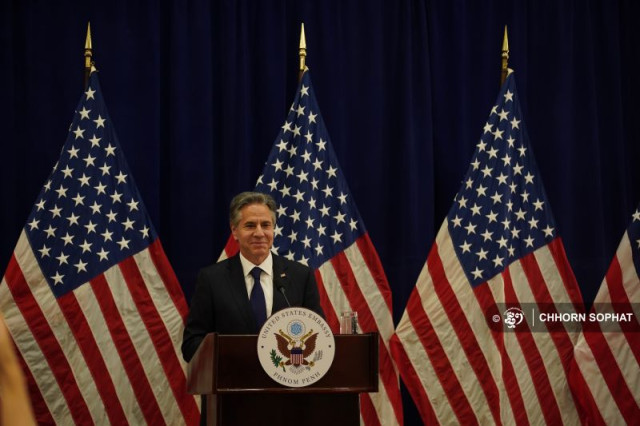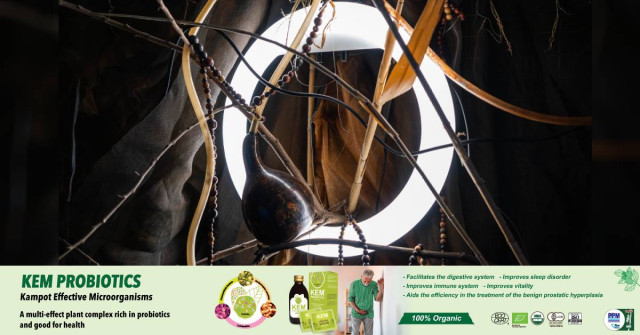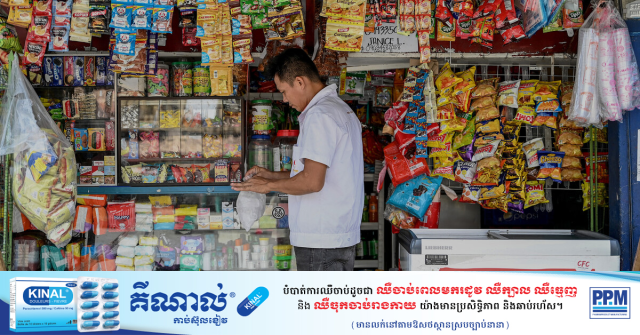Cambodia Challenges US Rights Criticism

- By Phoung Vantha
- March 23, 2023 5:50 PM
PHNOM PENH – The government has defended Cambodia’s freedom of expression after wide-ranging rights criticism in the US State Department’s 2022 Human Rights Report.
The report sets out issues in fields ranging from political to media restrictions and starts with the banning of the opposition Cambodia National Rescue Party in 2017.
It points to the ruling Cambodian People’s Party winning all 125 National Assembly seats in the 2018 national election which it says turned the country into a de facto one-party state with a government that regularly acted in an authoritarian manner.
However, the Cambodian Foreign Ministry said freedom of expression remained alive and dynamic and the report exposed a double standard in the US practice.
"The high rate of mobile internet penetration has provided ordinary citizens with unhindered access to information from wide-ranging sources," the ministry said.
All charges were in response to constitutional and criminal breaches, irrespective of political motives. Defendants had full rights to be heard as well as full access to legal defense.
“The report turned a blind eye to the dangerous and extremist rhetoric of certain opposition elements, spreading disinformation, throwing indiscriminate insults and slanders, inciting violence and racial hatred, and calling on sedition. All of these acts would be condemned in the Western world, the ministry said.
Political party affiliation or a purported status as “human rights defenders” had no bearing when it came to illegal acts.
“A crime is a crime, and that crime cannot be justified for other aspirations.”
The ministry said reports on other countries, including Cambodia, expose blatantly a double standard in US practice, particularly in the absence of its own country report.
“The report is simply a selective compilation of events based on unverified publications of foreign-funded NGOs.
“The purported ‘credible sources’ whose credentials are questionable does not lend any credibility to the report.”
The State Department document sets out its assessment of human rights in countries around the world.
Of Cambodia, it says, “Significant human rights issues included credible reports of: unlawful or arbitrary killings; torture and cruel, inhuman, or degrading treatment or punishment by the government; arbitrary detention by the government; political prisoners and detainees; and serious problems with the independence of the judiciary.”
There were serious restrictions on freedom of expression and media, including violence and threats of violence, unjustified arrests or prosecutions of journalists, criminal libel laws, and censorship.
Serious restrictions applied also to internet freedom and there was substantial interference with the freedom of peaceful assembly and freedom of association, including overly restrictive laws on the organization, funding, or operation of nongovernmental organizations and civil society organizations.
Other issues were an inability of citizens to change their government peacefully through free and fair elections; serious restrictions on political participation; serious and pervasive government corruption, including in the judiciary; serious government restrictions on or harassment of domestic or international human rights organizations.
“A pervasive culture of impunity continued,” it says.
“There were credible reports that government officials, including police, committed abuses and acts of corruption with impunity, and in most cases, the government took little or no action. Government officials and their family members were generally immune to prosecution.”
The report says the Constitution provides for an independent judiciary, but the government did not respect judicial independence, exerting extensive political control over the courts.
“Corruption among judges, prosecutors, and court officials was widespread. The judicial branch was inefficient and could not assure due process or fair trials. At times the outcome of trials appeared predetermined.”
“The government, however, greatly restricted free expression, including by independent news media and other dissenting voices; many individuals and institutions reported widespread self-censorship, particularly on social media,” the report says.
“Threats and violence against journalists and reporters remained common.
On Internet freedom, the report says there were credible reports that government entities monitored online communications.
“The law gives the government legal authority to monitor all telephone conversations, text messages, email, social media activity, and correspondence between individuals without their consent or a warrant.
“Any opinions expressed in these exchanges that the government deemed to impinge on its definition of national security could result in a maximum of 15 years’ imprisonment.”
It says that as of December, a local human rights NGO estimated that authorities held approximately 40 political prisoners and detainees.
Separately, Rights group LICHADO has published a list which it says documents 67 people imprisoned for peaceful political, environmental, social, land, or labour activism, as well as journalists and others unjustly detained by the government.
These range from former opposition leader Kem Sokha to other former Cambodia National Rescue Party officials and Thach Setha, 69, Candlelight vice-president, who has been held since Jan. 16, to land activists and journalist Kao Piseth, 32, who was sentenced to 2 years in prison and has been detained since Jul. 14, 2021.














